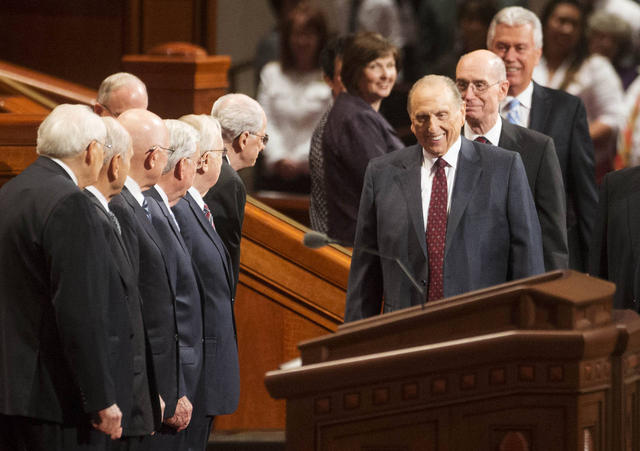Question
Hey Gramps.
I just received the Deseret Book mailer, and I see several books written by general authorities. While I’m sure these are inspiring words, I cannot help but question what happens to the proceeds from the sales of these books? It looks a lot like the general authorities are profiting from their positions as leaders of the church, which smacks of priestcraft. Please help me see how this is not the case.
Thanks!!
SMR
Answer
SMR,
I think the best way to answer your question is to first understand and define priestcraft. The Book of Mormon gives us the most clear definition and examples, and Nephi is the first prophet to speak of it. His definition is the one that is used by the Church in the Guide to the Scriptures:
. . . priestcrafts are that men preach and set themselves up for a light unto the world, that they may get gain and praise of the world; but they seek not the welfare of Zion. (2 Ne. 26:29)
Alma actually dealt with a man, Nehor, who taught and encouraged people to engage in priestcraft:
. . . preaching to them that which he termed to be the word of God . . . declaring unto the people that every priest and teacher ought to become popular; and they ought not to labor with their hands, but that they ought to be supported by the people . . .
many did believe on his words, even so many that they began to support him and give him money.
And he began to be lifted up in the pride of his heart, and to wear very costly apparel, yea, and even began to establish a church after the manner of his preaching. . .
there were many who loved the vain things of the world, and they went forth preaching false doctrines; and this they did for the sake of riches and honor. (Alma 1:3, 5-6, 16)
From the context of these passages it becomes clear that priestcraft involves money, the intention to get gain and praise of the world, and generally, false doctrine as a mechanism to engage and attract belief. However, while some priestcraft is obvious, some might not be. Elder Bednar pointed out:
“Anything you or I do as an instructor that knowingly and intentionally draws attention to self—in the messages we present, in the methods we use, or in our personal demeanor—is a form of priestcraft that inhibits the teaching effectiveness of the Holy Ghost. ‘Doth he preach it by the Spirit of truth or some other way? And if it be by some other way it is not of God’ (D&C 50:17–18)” (“Seek Learning by Faith” – an evening with Elder David A. Bednar, Feb. 3, 2006)
If we consider Elder Bednar’s definition, we may all be guilty at some point of errors akin to priestcraft. Even Moses, a great prophet, once abused his authority and position in such a way. In Numbers 20 we read about how Moses took credit for the Lord’s miracle, and didn’t even perform the miracle in the way the Lord instructed. Taking credit was a form of false doctrine, and would have enabled him to easily attract the attention and belief of the Israelites. His intentions may not have been malicious but he certainly deflected praise that ought to have been directed to the Lord.
With all this in mind, in regard to your primary concern, while it is certainly possible for individual prophets and apostles, as well as other leaders in the Church to engage in priestcraft, I do not believe that the profits from book sales alone would qualify. Here are some reasons related to principles already discussed:
- If earning money were the sole criteria, all BYU religion course professors would be considered practitioners of priestcraft.
- Generally, each book is published as the author’s own opinion and specifically disclaims against representing the official doctrines of the Church. Similar to the disclaimer I make here at askGramps.
- If false doctrine is taught (even if unintentional), and the work is of sufficient significance or use, it or the author is censured by the Church, sometimes publicly. This has happened various times to authors such as Orson Pratt, Bruce R. McConkie, etc. Those who are faithful have openly rejected or corrected their original writing. The unfaithful have apostatized or been excommunicated, further clarifying their actions as priestcraft.
- The sincere student of books published by individual General Authorities will find that the messages contained do not lead the individual to worship or praise the author, but are intended as personal insights and messages to help draw one closer to Christ.
- In their books, the brethren do not claim that their books or teachings are necessary to lead one to salvation, and they do not claim secret knowledge that would be unavailable through personal study of the scriptures and the Spirit of God.
While the use of materials outside of those published by the Church is not necessary to an individual’s salvation, we are encouraged by the Lord to learn from the ‘best books‘. Many of these ‘best books’ may be scientific or otherwise valuable knowledge of man, such as texts used in schools; others can come from students of the gospel, whether a prominent General Authority, or any other member of the Church. Perhaps the simplest qualifier is that given by Moroni, when he said, “every thing which inviteth and enticeth to do good, and to love God, and to serve him, is inspired of God”. I feel that the published writings of the General Authorities of the Church are intended to invite us to do good and to follow our Savior, Jesus Christ.
Gramps







